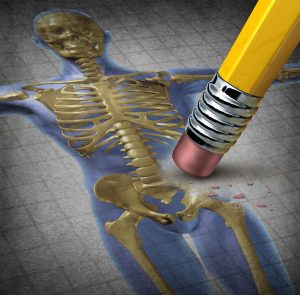Strong bones your whole life long will help keep you healthy and active. But how do you get and keep strong bones?
Bone formation begins when you do and continues through your twenties, unless other factors such as insufficient nutrients inhibit optimal bone formation. After age thirty, your bones are considered “built” to peak bones mass. Here’s more about Thus, until menopause for women or throughout adulthood for men, only minimal bone loss should occur. And yet, for many, bone loss is a serious health issue. So, what happens and how can we avoid unwanted bone loss with better nutrition?

What is osteoporosis and osteopenia?
Osteoporosis, or “porous bone”, is a chronic condition of bone loss – or more accurately, loss of bone mass. This may occur due to hormonal changes as well as insufficient nutrient intake. Patients with osteoporosis are more susceptible to bone fractures and breakage due to an increase in bone weakness and fragility. Osteopenia is the same condition as osteoporosis, only less severe. However, osteopenia can turn into osteoporosis over time if not addressed correctly. Your T-score is used to evaluate bone density as there are no real symptoms of osteoporosis.
“Better nutrition & better physical activity are not just Rx for a healthy, happy life, they are requirements to prevent bone loss.”
How to avoid Osteoporosis?
For strong bones, you need a blend of nutrients including calcium, magnesium, phosphorus, vitamins D and K. The daily calcium recommendation for healthy adults is about 1000mg/day (note: that is your daily total not your supplement amount only). You can get calcium from dairy, dairy replacements, sesame seeds, sardines (with bones), kale, broccoli, and tofu (check out my Better Calcium Menu for more calcium-rich recipe ideas). You should get magnesium from cacao, quinoa, cashews etc. But are you getting enough of each of these or too much, and what about the much harder to get from food, vitamin D?
Worried about bone loss, make sure to assess your daily total intake of these key nutrients with the Better Calcium, Better Magnesium, and Better Vitamin D evaluations.
A healthy digestive system and inflammatory response are also critical to maintain healthy bones as the nutrients your bones need must get to those cells. Remember, you are not what you eat, you are what you digest and absorb! Follow the Better Anti-Inflammatory Menu and make sure to assess your digestion at least quarterly or seasonally with the Better Digestive Evaluation. Sardines are one of my favorite foods for better bone health and to help prevent osteoporosis. I enjoy Bela sardines, wild caught and in organic oils, on gluten-free toast or tossed into a bowl of cauliflower like this Better Bela Bowl recipe.
 Your fitness choices matter too. Strength training and weight-bearing exercises such as dancing, walking, yoga, and stair climbing are great to build and keep bones strong!
Your fitness choices matter too. Strength training and weight-bearing exercises such as dancing, walking, yoga, and stair climbing are great to build and keep bones strong!
On the other hand, smoking and drinking have been associated with lower bone density, so if you drink alcohol, make sure you are making nutrient-dense and better activity choices discussed above, more often. Also choose better quantities, less frequently and avoid sodas as your mixers (watch my better nutrition video for better drinking tips and tools). Excess salt and caffeine have also been associated with osteopenia and osteoporosis, so monitor your intake. And steer clear of sodas, they do not offer your body anything it needs to run better.
Is there a better Osteoporosis treatment?
There are various approaches when it comes to treating osteoporosis. First line therapy includes bisphosphonate drugs such as Actonel, Boniva, and Fosamax which act by preventing the body from breaking down bone. However, there are large amounts of controversy out there regarding bisphosphonate drugs. There are concerns expressed about cancer risk. Leading doctors express concern that these medications contribute to other health problems: Dr. Mercola notes bisphosphonate drugs have been linked to eye inflammation, stomach ulcers, musculoskeletal pain, liver damage, and various other conditions. Dr. Weil also remarks on the potential for negative side effects of bisphosphonate drugs including severe degeneration of the jawbone. So, what should you be doing? Discuss all of this with your practitioner and if there is room for improvement in any of the nutrition (what you choose and choose to exclude more often) and activity, start there. There are also better bone building supplement choices like Natural Vitality Osteo Calm (enter code‘AKA’for 30% off).
Originally printed on ashleykoffapproved.com. Reprinted with permission.
Ashley Koff RD is your better health enabler. For decades, Koff has helped thousands get and keep better health by learning to make their better not perfect nutrition choices more often. A go-to nutrition expert for the country’s leading doctors, media, companies and non-profit organizations, Koff regularly shares her Better Nutrition message with millions on national and local television, magazines and newspapers. Visit her website at ashleykoffapproved.com.
